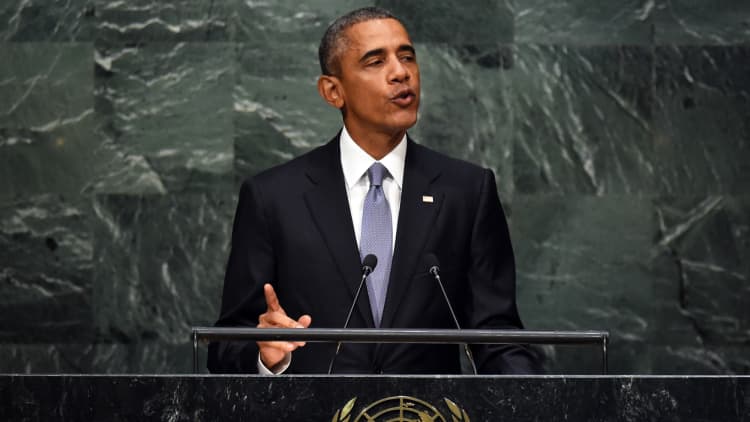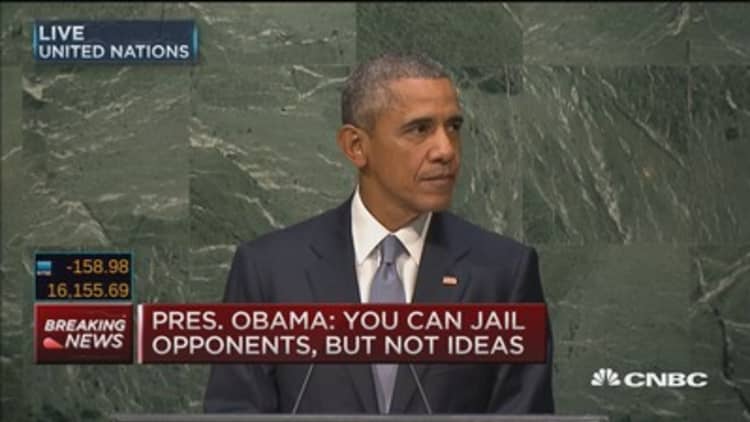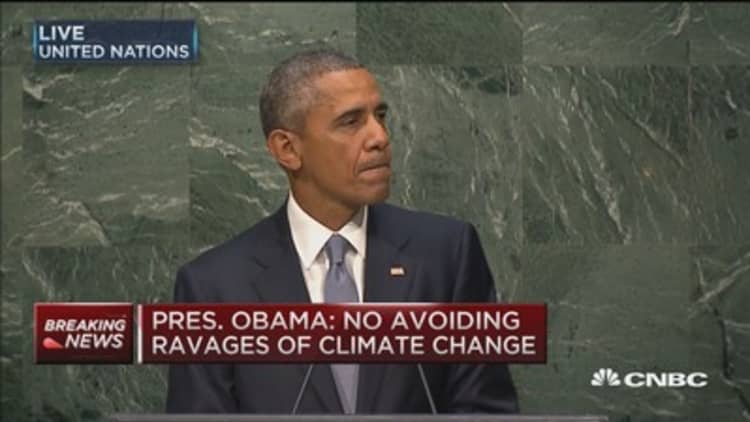


President Barack Obama told the United Nations on Monday he was prepared to use force if needed, but he called for peaceful approaches to global problems.
"I lead the strongest military that the world has ever known. And I will never hesitate to protect my country or our allies — unilaterally and by force — when necessary," he said. "But I stand before you today believing in my core that we, the nations of the world, cannot return to the old ways of conflict and coercion — we cannot look backwards."
While also referencing Syria and China, Obama focused the beginning part of his address on Russia and the actions of its president, Vladimir Putin.
Criticizing Moscow's actions in the ongoing civil war in Ukraine, the U.S. president said the situation would be better for Russians and Ukrainians alike if Putin had pursued a peaceful strategy.
"Imagine if instead Russia had engaged in true diplomacy and worked with Ukraine and the international community to ensure its interests were protected — that would be better for Ukraine, but also better for Russia, and better for the world," Obama said, emphasizing that he had no wish to return to another Cold War.
He also echoed comments from last week, saying that the U.S. is similarly pushing for China to resolve territorial disputes with its neighbors in the South China Sea because "like every nation gathered here, we have an interest in upholding the basic principles of freedom of navigation and the free-flow of commerce, and in resolving disputes through international law, not the law of force."
Recognizing that diplomacy is a difficult process, with often unsatisfying outcomes, Obama argued that powerful countries have an imperative to pursue these tactics.
"Leaders of large nations, in particular, have an obligation to take these risks — precisely because we are strong enough to protect our interests if and when diplomacy fails," he said.
Read MoreObama and Putin to meet on sidelines of UN
The president acknowledged that there will be times when "we must act" against global disorder, but he told those assembled at the U.N. that "we will be stronger when we act together."
On the subject of Syria, Obama said the U.S. will not apologize for its use of force against the Islamic State (also known as ISIS or ISIL), but that internal cooperation will ultimately be needed to heal the country.
He said the U.S. stands ready to work with any nation — including Russia and Iran — to resolve the conflict, but he called for recognition that returning to the "prewar status quo" is not the right solution. Russia has advocated supporting Bashar Assad's reassertion of dominance over the country as a means to combat the extremist groups operating in Syria.
"Let's remember how this started," Obama said. "Assad reacted to peaceful protests by escalating repression and killing that in-turn created the environment for the current strife."
The president argued that political realism demands compromises to defeat Islamic State — as Moscow argues — but that it also requires a "managed transition" away from Assad and to a new leader.
Obama was one of the first speakers at the opening of general debate for the 70th session of the U.N. General Assembly. He was scheduled to be followed Chinese President Xi Jinping, Putin and French President Francois Hollande.


